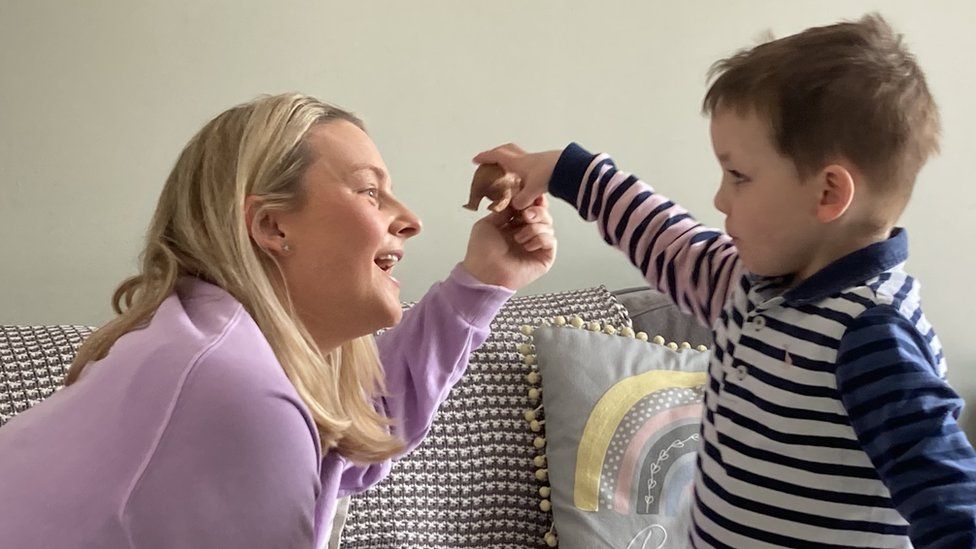
Henry’s mother Emma believes the Covid pandemic played a part in her son’s delayed language
By Aileen Moynagh
BBC News NI health reporter
A mother has spoken of her shock at the wait her young son faced for speech and language therapy.
Emma Adams sought help for Henry as she was concerned about his communication skills.
A report has found Northern Ireland children wait longer for speech and language therapy (SLT) than the rest of the UK.
The Department of Health said the health minister is committed to creating more SLT training places.
However, any increases will “have to be considered in the context of the very challenging financial situation” facing the department, it added.
Ms Adams, from Ballymoney, became concerned when she noticed her son was not saying as many words as other children at 18 months.
She asked her GP to make a referral for speech and language therapy.
“I knew that early intervention was key,” she said.
She had an introductory call “fairly quickly” where she was given information to help Henry at home, but it took nine months for her son to be seen face-to-face.
While she was quick to praise the speech and language therapists, she said there was a lack of sessions available.
Ms Adams managed to find a private therapist for her son, who he has been with for two years.
She said her concerns were validated when Henry was then diagnosed with an expressive language delay.
‘Pandemic baby’
Henry was seven weeks old when the UK went into lockdown and his mother believes that played a part in his delayed language.
“Henry missed out on a lot of social interaction, going to mum and tots groups and things like that,” she said.
“He missed out on all of those key elements of watching someone’s mouth but everybody was masked up so you couldn’t really experience people’s facial expressions.”
Ms Adams said the professional help had been a game-changer for Henry
Ms Adams said her son was making amazing progress but was still not “communicating to the level of his peers”.
“He’s now putting two words together and that just means everything to me,” she said.
“Having Henry assessed by a professional and having the specific techniques put in place to help Henry individually has been a game-changer.”
‘Far-reaching consequences’
A report by the Royal College of Speech and Language Therapists (RCSLT) revealed an 85% increase in the number of children under 18 in Northern Ireland waiting for speech and language therapy – up from 2,444 children waiting in 2021 to 4,527 in 2023.
It also found a rise in complex communication needs among children under five.
Ruth Sedgewick, from the RCSLT Northern Ireland, said early intervention was crucial
The professional body said these issues can have a lifelong effect on children, on their ability to form friendships, to remain in education and their potential to find employment.
Ruth Sedgewick, from the RCSLT Northern Ireland, said early intervention was crucial.
“If we do not get the early intervention right now, in those early years, the consequences are far reaching,” she said.
Ms Sedgewick said the Covid-19 pandemic played a role in children’s ability to communicate and masks also blocked communication.
“You cannot see the non-verbal cues and you cannot see the mouth forming the sounds and making the words, so there’s a huge lack of opportunity,” she said.
An increasing use of screens and parental stress have also had a major impact, she said.
“Screens reduce opportunities for social interaction to build communication skills,” she added.
The RCSLT said there were not enough speech and language therapists to meet the growing demand, and it called on Stormont to commit to fully investing in early speech and language intervention.
Ruth Crampton said waiting lists meant more children would need longer term help
Speech and language therapist Ruth Crampton said parents were seeking additional support but those who cannot afford to pay privately for services were suffering due to NHS waiting lists.
“The impact means that more children will need longer term speech and language therapy,” she said.
Anne Gormley, who has been principal of St Colmcille’s nursery in Downpatrick for more than 35 years, said there had been a huge increase in the number of children with speech and language difficulties.
“They’re having difficulties with attention listening skills,” she said.
“Making friends with other children is difficult and then it’s hard to understand them – it impacts all of their learning.”
Nursery principal Anne Gormley said therapy had made a difference to children’s behaviour
Ms Gormley said the nursery school had used funding to pay for speech and language therapy and it had made “a massive difference”.
“Their ability to concentrate is much better – their behaviour is better,” she added.
“Their learning skills have really improved, and it’s also given them an opportunity and a better chance for good education when they go through to primary school.”








